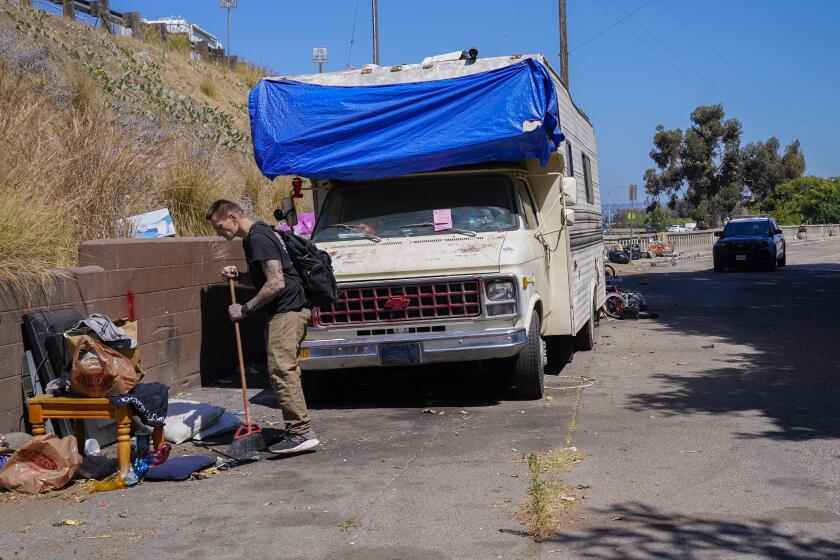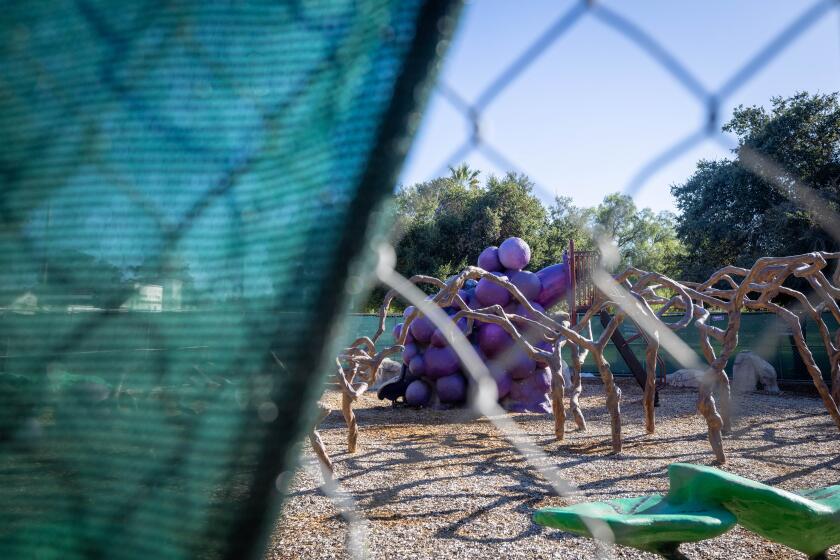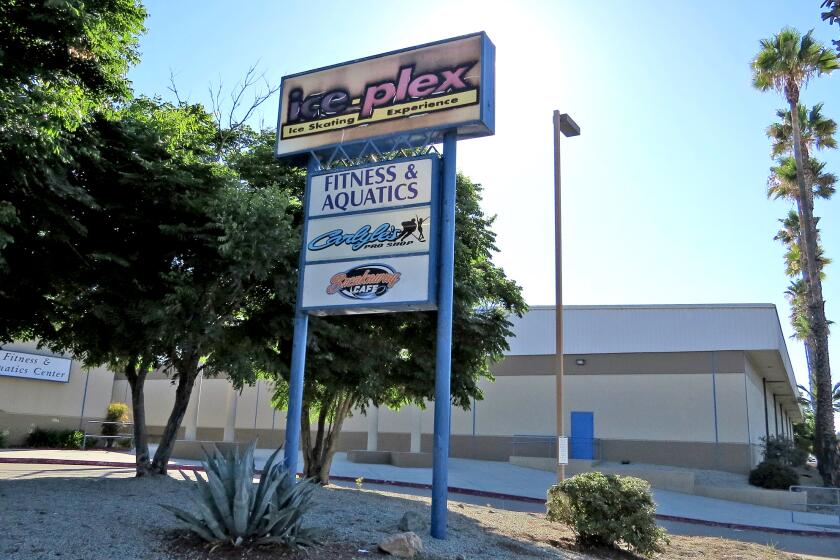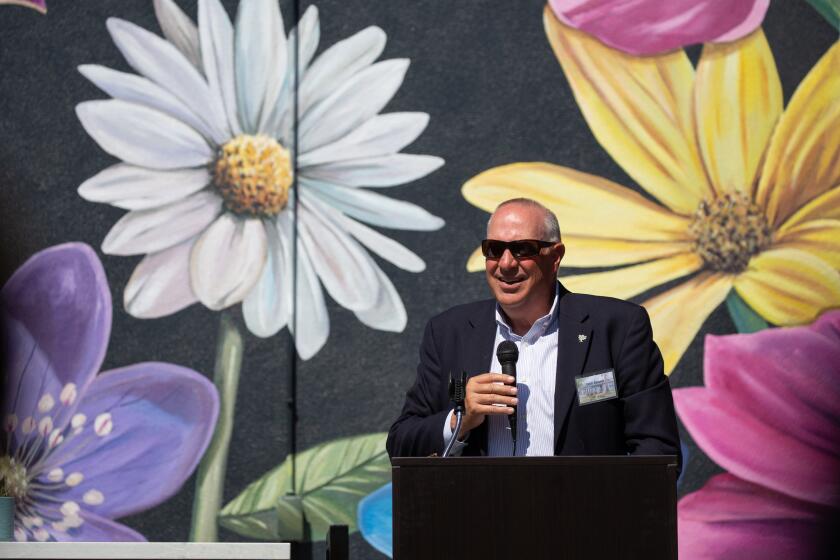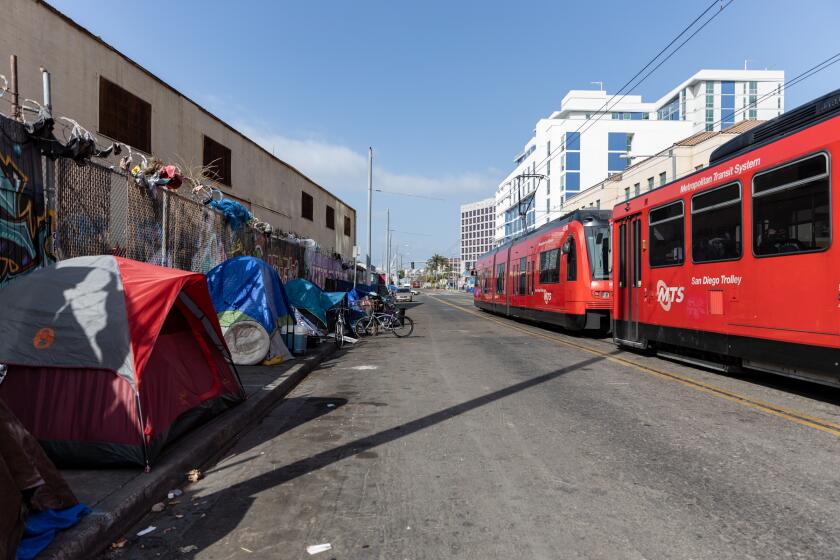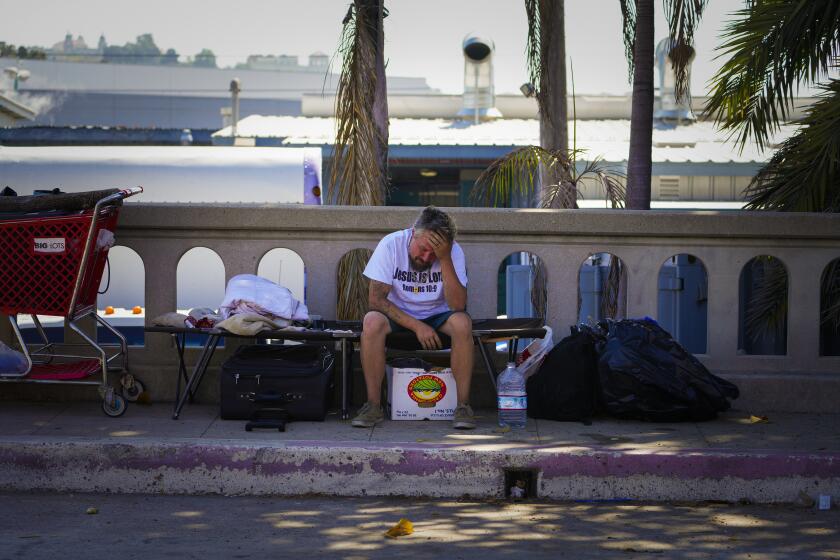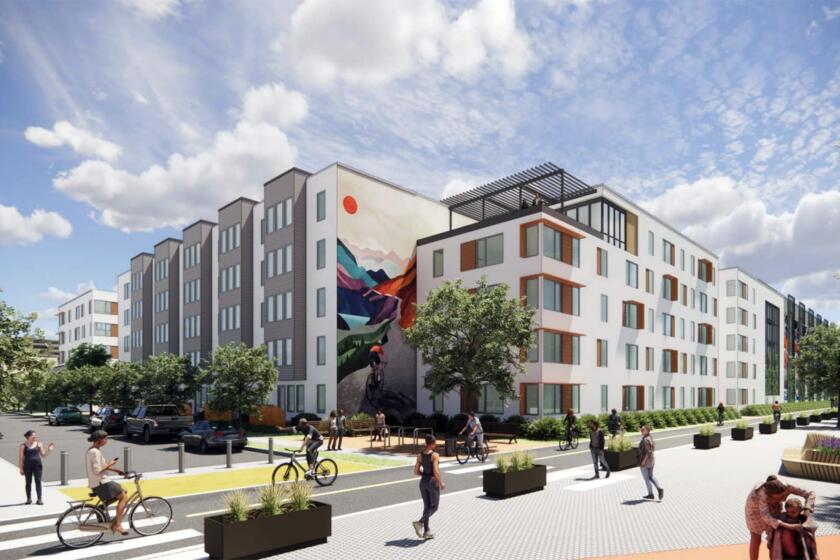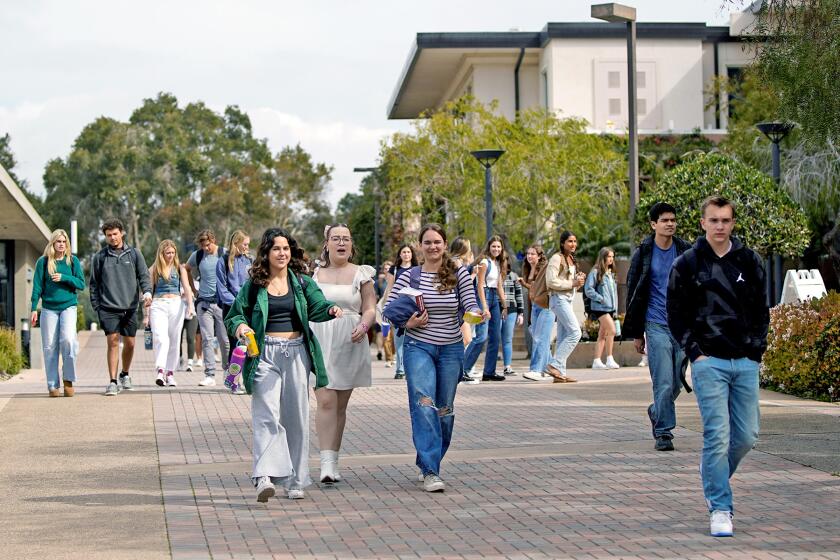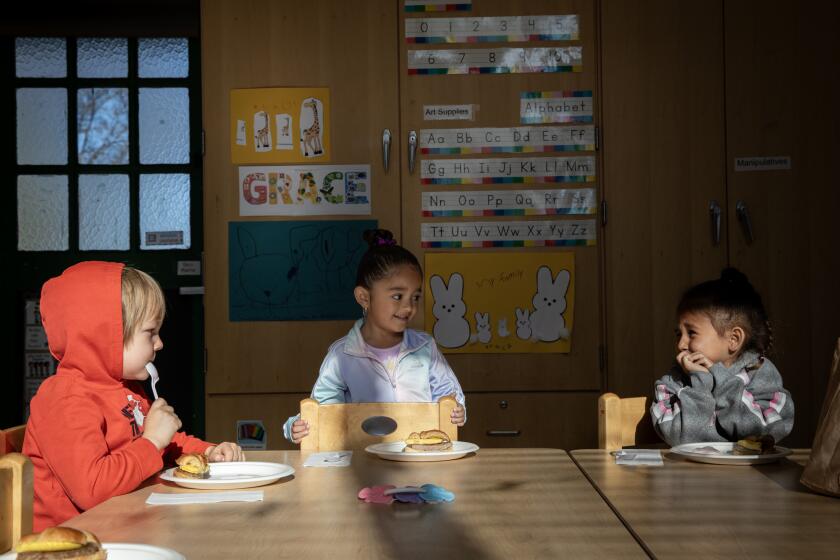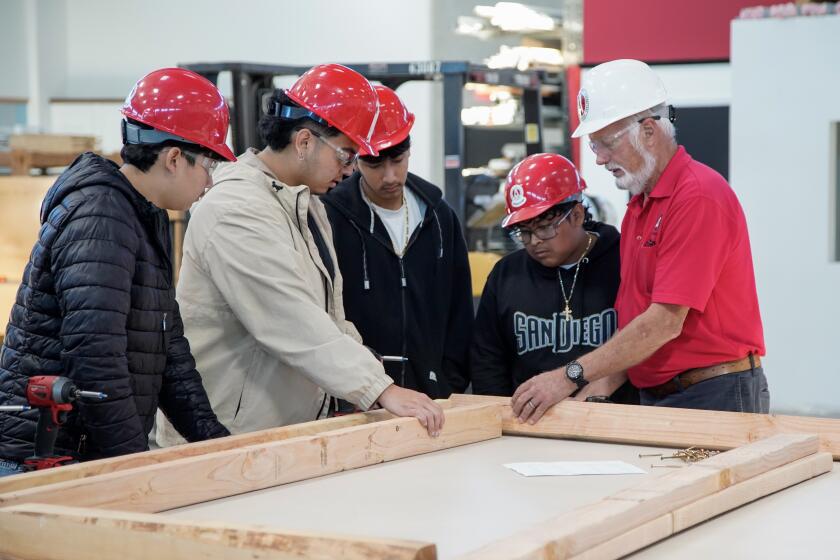Israeli-Palestinian debate revived at UCSD
The conflict between Israelis and Palestinians may seem a world away on most days, but the complex issues surrounding the situation have been front and center at local campuses lately.
The annual Justice in Palestine Week kicked off Monday at UC San Diego, where Students for Justice in Palestine and the Muslim Student Association have organized speakers, film screenings and a prominent display at the center of campus.
Two dozen tall panels containing images and information about the conflict lined Library Walk this week. About 20 Jewish San Diego residents visited the campus on Tuesday in what has become an annual routine for them to talk to students about what they see as misinformation on the wall.
Despite a couple of raised voices, interactions around the display were peaceful. Down the walkway, the head of the student group Tritons for Israel said the past couple of years have been quieter than previous years.
Things certainly were more calm at UC San Diego than at San Diego State University last week, where the outcry over posters that tied some Muslim students to alleged terrorist groups resulted in calls for SDSU President Elliot Hirshman to resign.
Tension between opposing sides of the Middle East dispute is not isolated to the two local campuses, and earlier this year the University of California Regents accepted a report on intolerance that decried anti-Semitism on campuses.
The Regents stopped short of fulfilling a request from students for a broad censure of opposition to Zionism, which some free-speech advocates said could restrict any criticism of Israel.
At UC San Diego this week, Students for Justice in Palestine and the Muslim Students Association are focusing their criticism of Israel with a screening of the film “The War Around Us” and talks by several speakers.
The panel wall is the most visible aspect of the week.
One panel defined “a new understanding of Anti-Zionism” as a rejection of “all forms of prejudice directed at anyone for their race, religion or ethnicity.”
Another described Israeli democracy as an incarnation of apartheid in South Africa, and another referred to “anti-Blackness” in Israel and had “Zionism=Racism” written at the bottom.
Sharona Benam, one of about 20 Jewish community members who came to campus Tuesday to see the wall, said she was particularly upset to see the reference to apartheid.
“It’s painful to see these lies,” said Benam, who lived in Israel for 11 years and said it is a democracy where everybody has equal voting rights for all citizens.
A member of Students for Justice in Palestine defended the panel Wednesday by saying there are separate roads for Jews and Palestinians, separate schools and segregated neighborhoods.
The student said she did not want her name printed because many Muslim students are concerned about publicity following a recent poster campaign that identified students at SDSU and other schools as allied with Palestinian terrorist groups.
The claim that conditions in Israel can be equated to apartheid in South Africa is controversial, hotly debated and sometimes based on conflicting opinions.
A lengthy article in the UK Guardian, for instance, reported that Israel maintains separate schools for Arabs and Jews on the grounds of language difference, but some see the system as a cover for discrimination.
Gary Fields, associate professors in the UC San Diego Department of Communications, said Wednesday that he sees the wall demonstration as a way for pro-Palestinian voices to be heard.
“The Israeli narrative dominates and is especially dominant within the various institutions of the U.S. government while the Palestinian narrative has far less resonance and influence,” said Fields, a 2010-11 research fellow with the Palestinian American Research Center. “I believe that the Justice in Palestine Week events at UCSD and many other campuses are aimed in part at rectifying some of this imbalance.”
The member of Students for Justice in Palestine said this week is about giving a voice to people.
“For us, we really want to spread awareness throughout our campus regarding the situation in Palestine and the injustices they face during occupation,” she said.
Nina Brodsky was among the members of the San Diego Jewish community who came to campus Tuesday morning to talk with students who were reading panels on the wall.
“I’ve learned that these college students are very bright,” she said. “We have to be respectful of how they take in information. They can’t be told what to think.”
Brodsky, who carried a small Israel flag, said she doesn’t confront anyone in front of the wall, but rather approaches anyone she notices already talking about it to give them another perspective.
As she spoke, loud Middle Eastern music began blaring from speakers near the Students for Justice in Palestine table.
“That happens every year,” Brodsky said, suggesting the music was deliberately turned up to drown her out. The music was turned down after a campus police officer had a discussion with some students.
The loud music was the closest to a confrontation between the students and the Jewish visitors that morning.
Brodsky and other people visiting the wall on Tuesday talked to several people about what they said were lies and distortions. Many critics of the wall and other events associated with Justice in Palestine Week said the anti-Israel messages also are anti-Semitic.
The member of Students for Justice in Palestine defended the wall, and said sometimes people are uncomfortable with it because they don’t recognize their own privilege.
She also said the wall is not anti-Semitic because it is not about religion, but Israeli policies,
“Israel uses that rhetoric that, ‘Oh, we are the Jewish state,’ when a lot of Jewish people disagree with what is going on in Israel,” she said. “When people think it’s something that’s anti-Semitic, I think that’s interesting because we’re not equating any of this to Judaism.”
This year’s wall on campus is noticeably smaller than the one used in the past. The Students for Justice in Palestine member said the old wall was showing its age, and this one is on loan from American Muslims for Palestine. She also said students plan to build a new wall for UC San Diego next year.
The wall on display this year has been on display at several other schools, including USC, UC Riverside, UC Santa Barbara and CSU Long Beach.
UC San Diego senior Adina Wollner, president of Tritons for Israel, said her organization steps up its presence during Justice in Palestine Week
“I think there are a few things on the wall that could be seen as hurtful,” she said. “I think it’s an uncomfortable week for many in our community, and that’s why Tritons for Israel is here.”
Wollner said tensions were greater in the years when the Associated Students of UC San Diego were debating whether to adopt a resolution to divest in companies that profit from the “military occupation” of land involved in the conflict.
Since adopting the resolution in 2013, Wollner said the tension on campus hasn’t been as great during Justice in Palestine Week.
Justice in Palestine Week coincidentally falls after a tense several weeks at SDSU. About a month ago, the David Horowitz Freedom Center put up posters that named seven students as allied with Palestinian terrorist to perpetrate a boycott, divestment and sanctions campaign against Israel.
After SDSU President Elliot Hirshman declined to condemn the posters, the Al Sharpton-founded National Action Network and the Council on American-Islamic Relations called for his resignation last week.
College students on both sides of the issue have reported incidents of harassment and intimidation in recent years.
Last week, Hirshman issued a statement condemning an anti-Muslim fliers that were posted in the Love Library.
In other incidents, A female Muslim student on campus last year reported someone had grabbed her hijab, a head scarf, while she was in an SDSU parking law.
A swastika was painted on a Jewish fraternity house at UC Davis in one incident, and some UCLA students questioned whether a Jewish student should be disqualified from serving on a campus judicial panel because of her religion.
Jewish students in the University of California system has complained about feeling uncomfortable or intimidated at their schools because of other students, especially during times of demonstrations against Israel.
Get Essential San Diego, weekday mornings
Get top headlines from the Union-Tribune in your inbox weekday mornings, including top news, local, sports, business, entertainment and opinion.
You may occasionally receive promotional content from the San Diego Union-Tribune.

